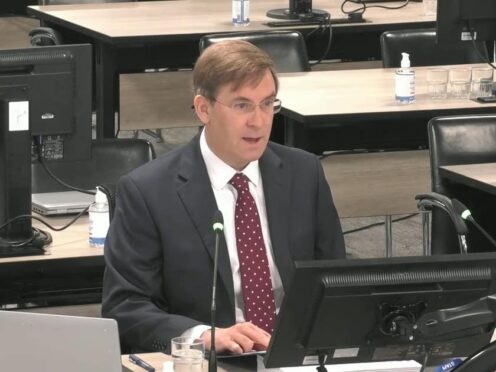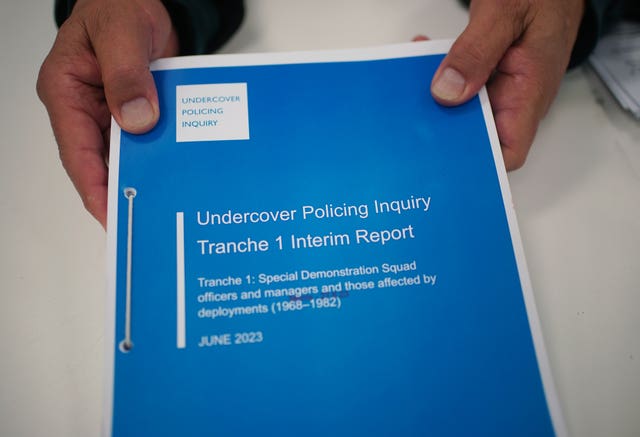
The lead lawyer in the public inquiry into undercover policing has warned the next government and law enforcement to “heed the lessons” from past use of police spies.
David Barr KC said the inquiry is not purely a historical exercise and that it is important for those in charge of undercover policing tactics to learn lessons from the past.
A report by the current Government’s adviser on political violence, Lord Walney, advised sweeping crackdowns on protests, and said police should have “extensive intelligence” about extreme political protest groups.
The document, published in May, said there should be a review of whether “undercover surveillance is being used appropriately in the context of public order and aggravated activism”.
The second stage of the Undercover Policing Inquiry (UCPI) began on Monday, with this batch of hearings looking at the since disbanded secret Metropolitan Police unit the Special Demonstration Squad (SDS) between 1983 and 1992.

In February last year a report following the first hearings, which looked at the SDS between 1968 and 1982, found that the squad should have been shut down in the first years of its existence.
It said that, of the groups spied upon during that period, only three were legitimate targets.
Making his opening statement on Monday, counsel to the inquiry Mr Barr said: “Lest anyone consider this a purely historical exercise, it is important to learn lessons from the past.
“The question of undercover surveillance of activists appears to be back on the agenda in the light of Lord Walney’s recent report entitled Protecting Our Democracy From Coercion.
“Anyone considering this issue would be well advised to heed the lessons that emerged from (chairman Sir John Mitting’s) interim report and the evidence that we continue to publish.”
Opening statements are due to be heard on behalf of participants including the Metropolitan Police, two women deceived into relationships with officers, campaigners including CND members and veteran politician Diane Abbott, and undercover officers, until the end of Wednesday.
Mr Barr set out which evidence will then be heard in a series of hearings taking place in July and early August, and then for several months from September.
The inquiry will hear from 14 undercover officers whose cover names are known, seven of whom will give evidence in person. They were employed by the SDS between 1978 and 1995.
At least 10 members of the public who were targeted by police spies will also speak in person, with evidence from at least another nine taken in writing.

Setting out the context at the time, Mr Barr talked about the Sex Pistols releasing Anarchy In The UK in 1976, fears around the Cold War, the series of Irish republican terrorist bombings throughout the 1980s and into the 1990s, and rioting sparked by racial tensions and the poll tax.
Groups targeted included the Campaign for Nuclear Disarmament, and women’s peace campaigns including Greenham Common Women.
The first female officer to be used by the SDS for several years said she was told by a superintendent that then-prime minister Margaret Thatcher wanted to know what Greenham Common Women were doing.
Mr Barr said there was “significant reporting” on groups that campaigned against racism and questioned the actions of the police.
This came during a time that saw tension between the community and the police spark the 1981 Brixton riots, and then anger over the 1985 death of Cynthia Jarrett, the police shooting of Cherry Groce, and the murder of Pc Keith Blakelock.
Later Roland Adams and Stephen Lawrence were both murdered in racist attacks in the early 1990s.
In 1993 there were riots in Welling during anti-BNP marches, when undercover police suggested some Socialist Workers Party members were involved in a plot to burn down a BNP bookshop, which the group denied.
Mr Barr said: “There is significant reporting on groups whose sole or primary purpose was anti-racist campaigning, and we will be examining closely why this was so.
“There is a connection, in many cases, between groups which campaigned against racism and those which monitored or took issue with policing in London.
“In many cases, protest was directed against police conduct that either was or was perceived to be racist.”
One undercover officer, Trevor Morris, often used the name Bobby McGee, but also had available to him an identity taken from a deceased child, Anthony Lewis.
Mr Barr said: “We have received a witness statement from Anthony’s younger sister, Marva. In it, amongst other things, she expressed her fury and disgust that a black boy’s identity was used to infiltrate a group which campaigned against racism.”
The officer is also accused of deceiving two women into sexual relationships, known only as Bea and Jenny, who will give evidence this summer.

Peter Skelton KC, for the Metropolitan Police Commissioner, began his opening statement by acknowledging the “serious wrongdoing” by some SDS officers.
This included deceitful relationships with women by at least nine officers in this period, which he called “completely unacceptable”.
He said: “The Metropolitan Police Service apologises to the women affected and to the public for these failings, and for the wider culture of sexism and misogyny which allowed it to happen.”
Mr Skelton later added: “Such conduct was a gross violation of the women’s privacy and human rights.
“It was abusive, deceitful, manipulative and wrong. The Metropolitan Police Service apologises again unreservedly to the women whose lives have been and continue to be affected.”
He also apologised to the wives, partners and families of the officers, and for the failures of management to prevent it.
There was unnecessary reporting on political and social campaigns that posed no threat to public order, and there was a general failure by managers to lead the unit properly, the inquiry was told.

Enjoy the convenience of having The Sunday Post delivered as a digital ePaper straight to your smartphone, tablet or computer.
Subscribe for only £5.49 a month and enjoy all the benefits of the printed paper as a digital replica.
Subscribe